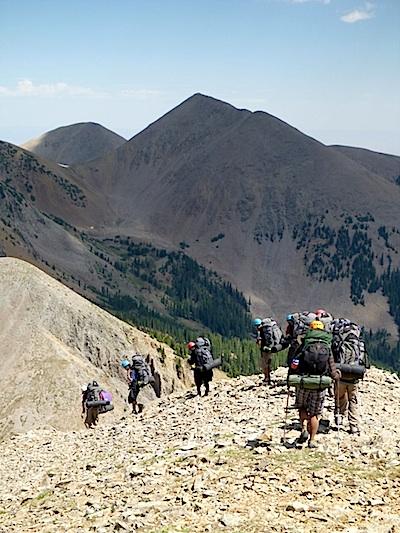
A physics professor believes he knows why smaller hikers can haul heavier backpacks than might be expected/KSU
Physics seems to have an answer for just about everything. How else could you explain why smaller backpackers can carry rather large backpacks?
The answer lies in the fact that, along with your backpack, you have to carry your own weight, points out Kansas State University physics professor Michael O'Shea, who also leads Outward Bound backpacking treks.
Professor O'Shea started to wonder about the matter while on an extended backpack trip in southern Utah. During that trek, he noticed that some of the smaller students could comfortably carry a greater pack weight than the larger backpackers of similar fitness levels.
To investigate this difference, the professor created a model that he believes more accurately estimates the pack weight a given hiker will be able to carry.
'Online advice from several sources was somewhat misleading in suggesting that pack weight should be a certain percent of a person's weight,' said O'Shea in a university release.
However, he points out that "as the size of any animal increases, strength increases more slowly than body weight'the reason why tiny ants can carry a disproportionately heavy load compared to their weight."
The professor combined this information with body scaling proportions obtained from other research to create a model matching his observations. The resulting equation takes into account the hiker's entire load'backpack plus body weight'and can be used to determine the maximum backpack weight for an individual of a given size.
'Overall strength of an individual does not determine how heavy a backpack a person can comfortably carry,' said Professor O'Shea.
His resulting model does make a few assumptions'namely, that the hikers being compared have similar body-fat percentages, and thus that increase in size does correspond to a proportional increase in strength. Nevertheless, it provides a more nuanced estimation of hikers' carrying capacity than does a simple proportion of body weight.
You can find the professor's resulting article from his modeling in the Backpack Weight and the Scaling of the Human Frame article that appears in the journal Physics Teacher.



Comments
I think the bigger question is "why" would you carry a heavy pack. I don't believe humans are meant to be beasts of burden, so to speak. With the advent of light weight and ultra light weight gear who in their right mind wants to end the day with sore, aching feet, knees, hips and backs.
Whilst I fully agree that we should not seek to carry heavy packs, the situation remains that smaller people, like myself, will end up with a certain amount of weight no matter the quality of our gear and how carefully we pack it. It would be unsafe in many situations to leave behind items which necessarily add to the load which requires carrying. Therefore, I find that I carry approximately 12kg including bag when hiking/camping. My body weight is 44kg and height 150cm.